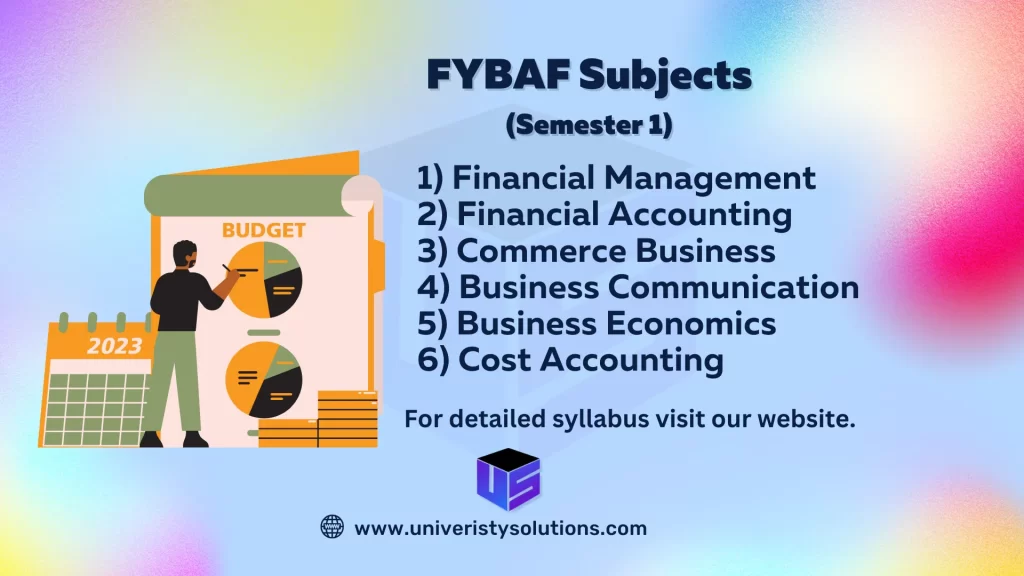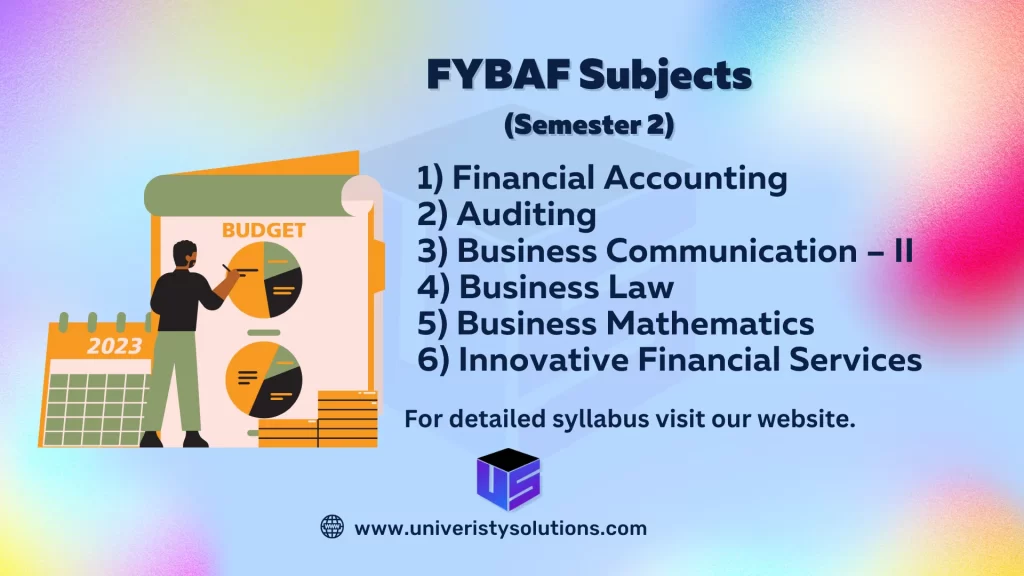
The curriculum and topics covered in BAF undergraduate courses prepare students for careers as accountants or in the fields of banking, business analysis, financial management, actuarial service, auditing, accountancy, taxation, economics, E-commerce, financial analysis, and financial planning. Accounting, finance, taxation, auditing, and risk management are all topics included in the bachelor of accounting and finance degree.
In the First year, a Bachelor of Accounting and Finance have a total of 7 subjects Which contain 2 Mandatory Subjects, 2 Skill Enhancement Subjects, 1 Ability Enhancement Subjects, 5 Open Electives Subjects (2 subjects can be choosen by students)
To get the list of FYBAF subjects 2024 and syllabus, read the entire article.
FYBAF Subjects
(Semester 1)
(FYBAF means First Year of Bachelor of Accounting and Finance)
Major: Mandatory
1) Financial Accounting – I
2) Auditing – I
Vocational / Skill Enhancement Course
3) Vocational Skills in Accounting and Finance Paper – I (Introduction to Financial Functions)
4) Vocational Skills in Accounting and Finance Paper-II (Preparation of Financial Budgets)
Ability Enhancement Courses (AEC)
5) Business Communication Skills – I
Open Electives (OE)
6) Introduction to Basic Statistics – I
7) Quantitative Techniques – I
8) Marketing Mix – I
9) Introduction to Export Management
10) IT Fundamentals of Computers
FYBAF Subjects (Chapters)
FYBAF SEM 1 Financial Accounting – I Chapters
Chapter 1 – Introduction to Accounting Concepts and Accounting Standards.
Chapter 2 – Final Accounts of Manufacturing Concern.
Chapter 3 – Departmental Accounts.
Chapter 4 – Accounting for Hire Purchase.
FYBAF SEM 1 Auditing – I Chapters
Chapter 1 – Introduction to Auditing
Chapter 2 – Principles of Audit
Chapter 3 – Audit Planning, Procedures and Documentation: Audit planning & program
Chapter 4 – Audit Planning, Procedures and Documentation: Audit working papers
FYBAF SEM 1 Accounting and Finance Paper – I Chapters
Chapter 1 – Excel Basics
Chapter 2 – Financial Functions in Excel
FYBAF SEM 1 Accounting & Finance Paper – II Chapters
Chapter 1 – Introduction to Financial Budgeting
Chapter 2 – Preparation of Budgets in Excel
Related Posts :
FYBAF Subjects
SYBAF Subjects
TYBAF Subjects
FYBAF Syllabus
SYBAF Syllabus
TYBAF Syllabus
FYBAF Subjects
(Semester 2)

Following are the list of FYBAF Subjects (Semester II):
1) Financial Accounting-Special Accounting Areas
2) Auditing – II
3) Business Communication – II
4) Vocational Skills in Accounting & Finance Paper
5) Vocational Skills in Accounting & Finance Paper – IV
FYBAF SEM 2 Financial Accounting – II Chapters
Chapter 1 – Accounting From Incomplete Records
Chapter 2 – Consignment Accounts
Chapter 3 – Branch Accounts
Chapter 4 – Fire Insurance Claims
FYBAF SEM 2 Auditing Chapters
Chapter 1 – Auditing Techniques
Chapter 2 – Reading Ledger Account
Chapter 3 – Vouching
Chapter 4 – Verification
FYBAF SEM 2 Vocational Skills in Accounting & Finance Paper – III Chapters
Chapter 1 – Understand the Significance of Forecasting in Finance
Chapter 2 – Creating Forecasts using Excel
FYBAF SEM 2 Vocational Skills in Accounting & Finance Paper –
IV (Data Visualization) Chapters
Chapter 1 – Introduction to Data Visualization
Chapter 2 – Creating charts using excel.
FYBAF SEM 2 Business Communication – II Chapters
Chapter 1 – Presentation Skills
Chapter 2 – Group Communication
Chapter 3 – Business Correspondence
Chapter 4 – Language and Writing Skills
Tips to score good marks in FYBAF Exam
- Don’t wait until the last minute to start studying: begin early. You’ll have more time to learn the topic and solve questions, the earlier you start.
- Remain arranged: Plan a study schedule and stick to it. Take time to rest and refresh during breaks.
- Regularly review your notes: Regularly reviewing back your notes will help you keep the content in your memory.
- Practice, practice, practice: By working through sample problems and completing sample tests, you can identify your areas of weakness and become familiar with the exam’s format.
- Ask for assistance if you need it: If you’re having trouble with the subject, don’t be shy to ask for assistance. You can seek advice from your teacher, a classmate, or a tutor.
- Get a good night’s sleep: The night before the exam, be sure to get lots of rest. A mind that has got enough sleep is better prepared to memorize and recall information.
- Arrive early on exam day: Arrive early on the day of the exam to give yourself time to settle your worries and mentally prepare.
- Stay focused during the exam: Avoid being distracted during the exam by remaining focused. Take a deep breath and return your attention to the activity at hand if you realize that your mind is roaming.
- Don’t waste too much time on any one question: keep an eye on the time. If you start to struggle, leave it and return to it later.
- Review your exam after you’re done: After you’re finished, review your paper for a while. By doing this, you’ll be able to correct any mistakes you may have made and provide any answers you’re not sure about.
Pingback: SYBAF Subjects - Mumbai University | Semester 3 & 4 - University Solutions
Pingback: FYBAF Syllabus - Mumbai University | Semester 1 & 2 - University Solutions
Pingback: SYBAF Syllabus - Mumbai University | Semester 3 & 4 - University Solutions
Pingback: TYBAF Subjects - Mumbai University | Semester 5 & 6 - University Solutions
Pingback: TYBAF Syllabus - Mumbai University | Semester 5 & 6 - University Solutions
Pingback: Financial Management TYBAF Sem 6 Question Paper - University Solutions
Pingback: TYBAF Sem 6 Cost Accounting Question Paper | Free Download | Mumbai University - University Solutions
Pingback: TYBAF Sem 6 Economics Question Paper | Free Download | Mumbai University - University Solutions
Pingback: TYBAF Sem 6 Financial Accounting Question Paper | Free download | Mumbai University - University Solutions
Pingback: FYBAF Cost Accounting Paper Pattern 2023 - Mumbai University - University Solutions
Pingback: FYBAF Financial Accounting Paper Pattern 2023 - Mumbai University - University Solutions
Pingback: FYBAF books pdf Free download | Mumbai university - University Solutions